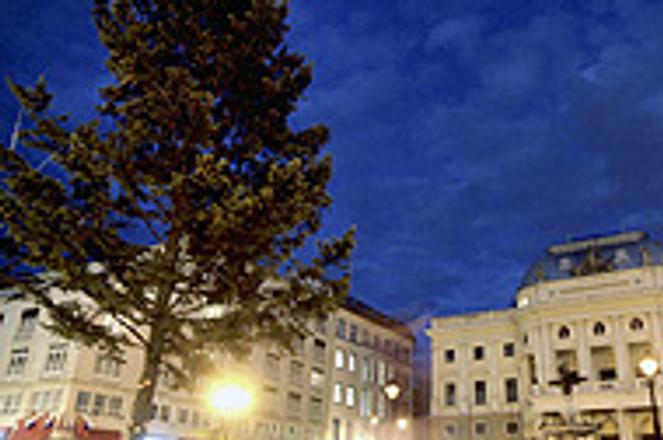Bratislava's Hviezdoslavovo Square is considered to have many of the city's finest restaurants.
photo: SITA
IF you think about it, we make a lot of cultural assumptions while dining out. We expect the food, language on the menu and décor to be different, but are we ever prepared to wait half an hour for a waiter to approach our table, or to pay extra for water, bread, or ketchup with our fries?
I remember once in New York City, my family and I were pretty ticked off about having to wait an hour at an Indian restaurant for the waiter to give us the check. It turned out the waiter was being polite, according to Indian culture, by not making us feel rushed.
In Slovakia, one of the first things you have to consider before dining out is what kind of mood you're in. If you want cheap, good alcohol and a raucous time, head to a krčma (pub). If intimate ambience and sophistication is more your style, find a vináreň (wine bar) or čajovňa (tea house). Tasty treats can be found at a cukráreň (sweet shop). And for a quiet setting and a hot meal, choose a reštaurácia (restaurant).
Wherever you go, keep in mind the importance of personal interaction. Restaurant staff will make eye contact and greet you, and expect you to reciprocate. They also use your greeting to know which language you speak. Pubs are a different story. Most are notoriously understaffed, so you might enter unnoticed. In both, you'll most likely be expected to find a table on your own.
Once seated, the differences keep popping up. In restaurants, the staff generally comes to take your order, but in pubs, you might have to flag your waiter down. This requires making eye contact, raising your finger, or perhaps going so far as to lean over in your chair and call out prosím Vás! (excuse me!).
Once you have their attention, you should ask for a jedálny lístok (menu). As you're perusing it, place your drink order. When the waiter comes back, be ready to order dinner, or you might lose your chance. Americans, be warned! "French fries" is still an unfamiliar term in Slovakia. In fact, most waiters catch only the "s" at the end of "fries" and end up bringing you rice. More successful is chips, pommes frites, or the Slovak word - hranolky.
When it comes to bread and butter, my mind often drifts back to New York, where those small things, plus condiments, and even ice water, were free with every meal. Here, you have to pay for everything. Ever ordered take out pizza? That Sk10 charge on your bill was for the pizza box.
Drinks are another interesting case. It's a common belief here that cold drinks are unhealthy, so if you want kolu/mineralku s ľadom (Coke/bottled water with ice), you'll have to ask for it. And listen carefully when inquiring about the price of wine by the glass. Most waiters quote the amount per decilitre, which can be misleading, since wine always comes in two- or three-decilitre servings.
Refills on drinks during dinner will require getting your waiter's attention again. But once you've finished, take a page from that Indian restaurant I mentioned and stay in your seats for a while. It's perfectly fine to sit and talk as long as you want. Staff here will never suggest you leave, no matter how many people are waiting.
When you're ready to pay, ask for the bill by saying either účet, prosím (the bill, please) or zaplatím (I'd like to pay).
Restaurant staff are paid an actual salary here (unlike in most of the US, where the majority of the salary is made up of tips), so, to many foreigners' great shock, tipping is not mandatory everywhere.
But if you've just finished a meal in the center of town and the service was good, tipping is certainly appropriate. Ten percent of the total is enough; twenty percent is too much. When handing your waiter the money, tell him how much you'd like to give, not how much you'd like to receive back in change. Do the same if paying by credit card, or just leave the tip in cash.
If you don't want any change, say Ďakujem (thank you) as you hand over the money. The waiter should immediately respond by thanking you back and saying good-bye (do videnia.)
Of course, not every dining experience goes exactly according to plan. But whatever you do, don't leave the money on the table.
Foreign Affairs is a regular column devoted to helping expats and foreigners navigate the thrills and spills of life in Slovakia. Please send suggestions or comments to stefan.hogan@spectator.sk.


